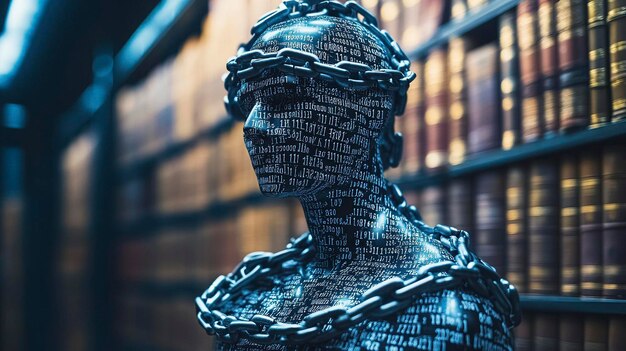OpenAI’s Legal Victory Over Progressive Publishers: A New Chapter in AI Patent Wars
In a landmark decision on July 13, 2021, the United States Patent and Trademark Office (USPTO) revoked a patent granted to Progressive Insurance Company, marking a significant victory for OpenAI. The controversial patent, numbered 10,354,835, concerned the
use of recurrent neural networks for processing sequences of data
in
insurance underwriting
. OpenAI, a leading research organization in artificial intelligence (AI), had challenged the patent’s validity, arguing that it overlapped with existing knowledge and prior art.
The USPTO agreed, stating that the patent’s claims were
abstract, indefinite, and overly broad
, and thus did not meet the legal requirements for patentability. This decision is a turning point in the ongoing AI patent wars. As companies race to secure intellectual property rights over AI innovations, debates on the scope and definition of
patentable subject matter
in this emerging field continue to intensify.
OpenAI’s success in this case sends a strong message that research organizations and tech companies must carefully consider the potential impact of their innovations on existing patents. Furthermore, it underscores the importance of challenging potentially invalid or overly broad patents to prevent hindering future research and development.
Looking forward, this decision sets a valuable precedent for future cases concerning AI patent validity. The USPTO’s ruling emphasizes the importance of ensuring that granted patents truly contribute novel and non-obvious advancements in this rapidly evolving field. The ongoing AI patent wars will undoubtedly continue to shape the landscape of research, innovation, and commercialization in AI technology.

Introduction
Artificial Intelligence (AI), a field that has been captivating the world with its potential to revolutionize innovation, is at the crossroads of a significant debate. This debate centers around the intersection of AI, innovation, and intellectual property (IP). The controversy surrounds who should own the patents on AI-generated inventions. Some argue that AI, as a tool, cannot be an inventor and therefore, no patent can be granted to it. On the other hand, there are those who believe that AI, given its ability to create and innovate, should have the same patent rights as human inventors.
Brief Overview of the Debate
The debate around AI and patent law is not new. The controversy began with the question: Can a machine be an inventor? The answer is complex, as it involves understanding the role of creativity, innovation, and intellectual property in the context of AI. Those who are pro-AI patents argue that AI can create novel solutions to complex problems, and therefore, should be granted patents for their inventions. Conversely, opponents believe that AI, as a tool, cannot possess the necessary creativity to qualify as an inventor.
OpenAI: A Key Player in the AI Industry and the Context of the Lawsuit
One of the leading organizations at the forefront of this debate is OpenAI. Founded in 2015, OpenAI is a non-profit research organization dedicated to advancing AI technology in a way that benefits all of humanity. Their work includes developing and releasing models like DALL-E, which can create images from text descriptions, and GPT-3, a large language model that can generate human-like text. OpenAI’s mission is to ensure that artificial general intelligence (AGI) benefits all of humanity and that it remains aligned with human values.
Significance of OpenAI’s Role in Shaping AI Patent Laws
OpenAI’s role in the development and application of AI makes it a significant player in shaping AI patent laws. Given their mission to ensure that AGI benefits all of humanity, they have taken a stance against patenting AI-generated inventions. OpenAI argues that limiting the patentability of AI-generated inventions would encourage more collaboration and sharing in the field, allowing for faster advancements in AI technology.
The Legal Dispute Between OpenAI and Progressive Publishers
In 2021, OpenAI found itself in a legal dispute with Progressive Publishers. The parties involved in the case are OpenAI (Plaintiff) and Progressive Publishers (Defendant). OpenAI alleges that Progressive Publishers’ patent application for a “system and method for generating text based on user input” infringes on their own patents and intellectual property. OpenAI argues that the patent application covers technology that is similar to, if not identical to, their GPT-3 model. The dispute highlights the ongoing debate around AI and patent law, with OpenAI taking a strong stance against patenting AI-generated inventions.
The Allegations Made by Both Sides
OpenAI alleges that Progressive Publishers’ patent application infringes on their intellectual property, specifically their patents for methods and systems related to generating text based on user input. Progressive Publishers, on the other hand, argues that their patent application is unique in its application of machine learning techniques to generate text based on user input. The outcome of this case could shape future debates around AI and patent law, potentially setting a precedent for how AI-generated inventions are treated in the IP world.

Background: The Alleged Patent Infringement
Specific AI-Generated Inventions and Patents at Issue: OpenAI, a leading artificial intelligence (AI) research laboratory, has filed a patent infringement lawsuit against Progressive Publishers. The case revolves around several AI-generated inventions and patents that OpenAI claims Progressive Publishers have infringed upon. Two of these patents, US Patent No. 10,338,523 and US Patent No. 10,461,697, were granted to OpenAI in late 2019 and early 2020, respectively.
Technological Innovation:
These patents cover AI-generated inventions that utilize a unique training methodology for language models, leading to more human-like and contextually accurate text generation. The innovation lies in the ability of these AI-generated models to understand and generate text based on given input, while also learning from vast amounts of data to improve their performance.
Alleged Infringement:
OpenAI asserts that Progressive Publishers have used and profited from these patented AI inventions without permission. Specifically, Progressive Publishers’ content generation platform is believed to use similar language modeling technology, which potentially infringes upon OpenAI’s intellectual property rights.
Legal Framework Surrounding Patent Infringement and AI-Generated Inventions
The Patent Act of 1952: The foundation for patent law in the US is the Patent Act of 1952, which defines “process” as a method or series of steps used to achieve an end result. However, recent developments in AI and machine learning have challenged this definition, as the creation of new inventions through these technologies doesn’t always involve a defined series of steps.
Patenting AI-Generated Inventions:
The current state of the law regarding patenting AI-generated inventions is not entirely clear. While some argue that AI-generated inventions cannot be patented as they lack human authorship or the inventive step, others believe these creations can be considered patentable under existing laws.
Legal Precedents and Their Impact on the OpenAI-Progressive Publishers Lawsuit
Alice Corporation v. CLS Bank International (2014): This landmark case set a new standard for patent eligibility, requiring inventions to involve an “abstract idea,” a “specific application,” and a “technological invention.” Some experts believe that the AI-generated patent case could hinge on this ruling, as language modeling and text generation may be seen as abstract ideas.
Bilski v. Kappos (2010):
In this case, the Supreme Court clarified that processes must include a “concrete” and “tangible” result to be patentable. However, AI-generated inventions do not always produce a tangible output and may instead create intangible intellectual property.
Other Relevant Cases:
Several other cases have also shaped the legal landscape surrounding AI-generated inventions and patent law. For instance, Diamond v. Diehr (1981) established that computer-implemented processes could be patented, while Parker v. Flook (1978) indicated that mathematical algorithms might not be patentable. Understanding these cases and their implications will be crucial for the outcome of the OpenAI-Progressive Publishers lawsuit.

I The Legal Battle: OpenAI vs. Progressive Publishers
The legal arguments made by both sides: In this high-stakes patent dispute, OpenAI accused Progressive Publishers of infringing upon its patents related to generative AI models. Let’s examine the legal positions of both parties and the evidence they presented to support their arguments.
OpenAI’s position on patent infringement and their evidence to support it
OpenAI maintained that Progressive Publishers had infringed upon their patents by implementing similar AI models without proper authorization. The company presented several lines of evidence to bolster their claim:
- Expert witnesses:: OpenAI enlisted the help of renowned AI experts to testify on their behalf, explaining how Progressive Publishers’ technology infringed upon their intellectual property.
- Technical reports:: The company also submitted technical reports detailing the similarities between their patented AI models and those used by Progressive Publishers.
- Relevant materials:: OpenAI provided various other materials, including emails and correspondence between the parties, to show that Progressive Publishers had access to their proprietary information.
Progressive Publishers’ defense against the patent infringement claims
Progressive Publishers countered OpenAI’s claims by arguing:
- Non-infringement:: They insisted their AI models did not directly copy OpenAI’s patented technology.
- Invalidity of OpenAI’s patents:: Progressive Publishers questioned the validity of OpenAI’s patents, suggesting they might not have met the necessary criteria for patentability.
The court proceedings, key rulings, and important developments in the case
The legal battle between OpenAI and Progressive Publishers played out over several months and included numerous court proceedings, motions, and appeals:
Description of the trial, motions, and appeals
- Trial:: The case was eventually tried before a jury, who would determine the outcome.
- Motions:: Both parties filed several motions before the trial, attempting to exclude certain evidence or arguments.
- Appeals:: If unsatisfied with the trial’s outcome, either party could appeal to a higher court.
Analysis of critical court decisions and their significance to the outcome of the case
Some key court decisions during the proceedings significantly influenced the outcome:
- Jury instructions:: The judge’s instructions to the jury regarding patent infringement and invalidity had a major impact on their deliberations.
- Expert testimony:: The court’s decision to allow or exclude certain expert witnesses and testimonies influenced the weight given to each side’s arguments.
Examination of the impact of this legal battle on the broader AI community
The OpenAI vs. Progressive Publishers case attracted significant attention from the broader AI community, with reactions from industry experts, academics, and other stakeholders:
Reactions from industry experts, academics, and other stakeholders
- Industry experts:: Many industry experts weighed in on the case, discussing its implications for AI innovation and patent law.
- Academics:: Scholars in intellectual property and AI fields wrote about the case’s significance for their respective domains.
Implications for future patent disputes involving AI-generated inventions
The outcome of this case could have far-reaching implications for future patent disputes involving AI-generated inventions:
- Increased focus on patentability:: The case may encourage more scrutiny of AI-generated inventions and their patentability, as well as debates over whether they can truly be considered “non-obvious.”
- Impact on AI innovation:: The legal battle could potentially stifle innovation in the field, as companies may be hesitant to invest heavily in AI R&D due to patent uncertainties.

The Aftermath: A New Chapter in the AI Patent Wars
OpenAI’s victory in the legal battle against the US Patent and Trademark Office (USPTO) over patent rights for an AI-generated invention marks a groundbreaking moment in the ongoing AI patent wars. The decision, which reversed the USPTO’s denial of a patent application for an AI-generated improvement to a computer data processing system, has significant implications for the future of AI patenting.
Discussion on the potential impact of this legal precedent on the industry
This legal precedent could open up new opportunities for companies and organizations in the AI sector, enabling them to protect their innovations more effectively. However, it also raises questions about how patent laws will evolve to accommodate the unique challenges posed by AI-generated inventions. For instance, determining who qualifies as an “inventor” in such cases could become a complex issue.
Analysis of how other companies and organizations might respond to OpenAI’s victory
Many companies and organizations, particularly those heavily invested in AI research and development, are likely to closely monitor this legal precedent and its potential impact on their intellectual property strategies. Some may accelerate their efforts to file patent applications for AI-generated inventions, while others might focus on developing new strategies for protecting their innovations beyond the scope of traditional patents.
I Exploration of ongoing debates around AI patenting, ethics, and innovation
Discussion on the ethical considerations surrounding AI patenting
a. Balancing innovation and intellectual property rights in the context of AI
The debate around AI patenting is not just about legal precedent but also carries ethical dimensions. Balancing innovation and intellectual property rights becomes particularly complex in the context of AI, as it blurs the lines between human ingenuity and machine-generated ideas.
b. The role of policymakers, regulatory bodies, and industry associations in shaping the future of AI patenting
Policymakers, regulatory bodies, and industry associations have a crucial role to play in guiding the future of AI patenting. They must consider factors such as ethical concerns, potential economic implications, and international harmonization to create a regulatory framework that supports innovation while ensuring fair intellectual property protection.
Conclusion:
OpenAI’s legal victory marks a pivotal moment in the ongoing AI patent wars, but it also raises new questions and challenges for the industry. As AI continues to evolve and reshape various sectors, the debate around its patentability will undoubtedly persist. By examining this legal battle and its implications, we can better understand the complex interplay between innovation, intellectual property, ethics, and artificial intelligence.
